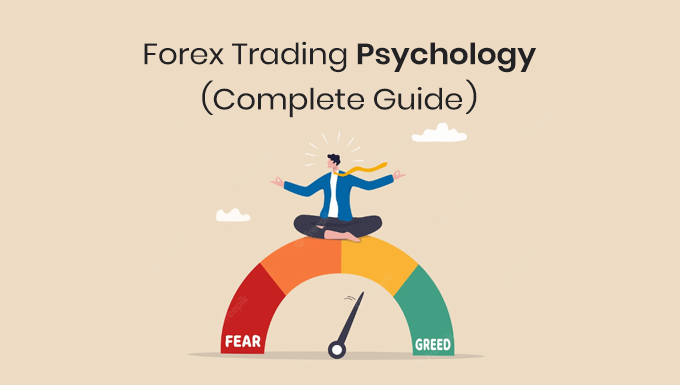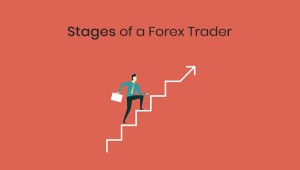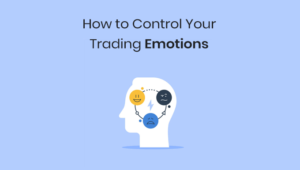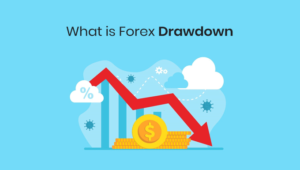Forex trading psychology has a lot to do with people’s emotions. Trading failures occur when traders are not confident or, on the contrary, are overconfident and underestimate the trading risks.
These emotions lead to a lot of unsuccessful trading attempts.
Table of Contents
• What Are the Emotions in Forex Trading?
• How to Learn to Control Your Emotions in Forex?
• How to Develop Your Trading Psychology?
• What Are the Rules of Forex Trading Psychology?
• Conclusion
What is Forex Trading Psychology?
In simple terms, forex trading psychology is the ability to control your mental state and emotions while trading.
The Forex trading market can evoke emotions in any trader. Learning how to deal with these emotions will help you become a better trader and stop making unnecessary mistakes.
What Are the Emotions in Forex Trading?
Here are the main emotions in Forex trading:
Fear
Fear makes you doubt yourself. You are afraid during the opening of a trade, missing a good time to enter, or closing the trade ahead of time, because you are afraid that the price is about to turn around and go against you. As a result, you lose profit. If you feel that fear has taken over you, trust your intuition and complete the trade for today.
Greed
If you have a consistent winning streak and have already earned enough for today, it turns into greed. Remember, winning streaks won’t last forever. Learn to stop in time before you lose all the profits you earned due to a stupid mistake. Set the maximum profit size, upon reaching which you will stop trading.
Excitement
There are times when a losing streak begins after winning trades. You want to quickly recoup your losses and end up making a number of mistakes – enter a trade before a trading signal appears, ignore stop losses, violate money management rules, etc. deposit. In this case, you need to pull yourself together and stop trading immediately.
Euphoria
The feeling of victory is something that everyone wants to feel all the time. However, if you succeed, you will think that every trade will be profitable. Do not give in to euphoria after several victories. Keep your head cool and stick to your trading plan.
How to Learn to Control Your Emotions in Forex?
Confidence in Forex trading comes with time. The novice trader will experience the ups and downs of the market, as well as various emotions.
It takes perseverance, and over time you will see that the psychology of trading can not only help you get started making money on Forex but also give you more control over your long-term success.
There are several steps you must take to suppress negative emotions that are getting in the way of your trading:
Learn to win and lose
The psychology of your wins and losses affects the way you trade. There are times when you make big profits, and then there are times when you hit a black losing streak. You must understand that this is all part of the trade.
Build a buffer with enough money so that in the event of a streak of losses, there is enough free money and it does not have a huge impact on you. If you cannot afford such a buffer, do not trade money that you do not want to part with.
Winning comes just as easily as losing, and the key is to take it all in stride and continue trading with a cool head. After consistently winning, you should consider taking a break. Overtrading can do a lot of emotional damage if you start losing your profits.
Take breaks from trading
Give yourself a break after every trade. This way, you can clearly understand your emotions and what steps you need to take next. Read the book to take a break from trading. Perhaps reading trading books during your break will give you new ideas to try when you return to trading.
Save these ideas for the next time you trade to incorporate them into your Forex trading plan.
Self-discipline and planning
Try to control your emotions when things don’t work out. To better control your emotions, write down your trading rules and develop a trading plan. When you have a trading plan and your own trading rules, then stick to them and write down all your actions in the trader’s diary.
Learning how to control your feelings and improve your trading psychology can help you move up in your trading career.
How to Develop Your Trading Psychology?
Forex trading can trigger a lot of emotions. When you go up after five wins, and then lose everything and keep losing, it can negatively affect your trading psychology and trading strategy. You need to work on your trading psychology in the following ways to avoid bad results caused by your emotions:
Positive thinking
Enter your trading session with a positive attitude. Remember that you have made progress in researching the market and taking any advice you may receive. Forex trading is not a personal challenge, it is primarily your job, not a game of roulette. Try to remove any emotion that interferes with your focus on trading and unsettles you.
Imagine yourself as a winner and a loser
Stabilize your mind. Remember that every coin has two sides. In this case, it is a gain and a loss of your profit. Imagine that you are on fire. You constantly find the right solutions, and everything goes in your favor. The Law of Attraction of Money can help with this, as visualization is one of the keys to a positive state of mind.
Seeing yourself as a loser will remind you that there are no real winners in trading. There is no one out there who can consistently win, and you are no exception. So when things go wrong and you lose your bottom line, know that this is part of the process.
Practice
Trading practice makes the psychology of trading perfect. When you trade and make profits and losses, you begin to see the chart and learn from it. Practice builds your patience and self-discipline. Even if you did everything right but the situation did not end in your favor, at this moment your discipline enters, and you begin to act in accordance with your trading plan on the machine without unnecessary feelings and emotions.
Next, we move on to the basic rules of trading psychology that will help you learn how to control your emotions and succeed in Forex trading.
What Are the Rules of Forex Trading Psychology?
1. Having a trading plan
Forex trading volume is over $5 trillion per day, making it the largest market in the world. US banks control a large share of the forex market. Along with banks, the US dollar receives 85% of that $5 trillion a day.
Knowing this basic information makes you understand that you cannot beat the entire Forex market. But you can come up with a plan that will bring you beneficial results. Structure and create goals for the amount of money you want to make. Having a strategy will help you control your emotions and plan each step.
A Forex trading plan should include the following steps:
Time to trade
Knowing when you are going to trade will help you better allocate your time. Most people trade:
– within the day
– once a day
– once a week
Strategy
You must have a trading strategy with prescribed trading rules. Before opening a trade, you must answer the following questions:
- When to start and stop trading?
- When to open and close a trade?
- What lot should be used to open a deal?
- What is the time to suspend trading?
- And other questions related to your strategy and trading style.
Trader’s diary
Use a trader’s diary so that you can constantly record your trades there. Later, you can understand why you made a profit or loss, as well as learn to control your emotions. Your trader diary should include the following entries:
- The date and time of entry when you entered the trade
- The name of the trading instrument – currency pair, cryptocurrency, gold, etc
- The price at which you bought or sold the asset
- Position size (lots)
- Your key target for taking profit (take profit). It must be determined in advance before you start trading
- Potential risk in pips and dollars, that is, money that you can lose (stop loss)
- Exit price
- The reason why you exited the trade (take profit / stop loss triggered, the opposite signal appeared, experienced emotions in trading, other reasons)
- The number of points you gained or lost
- The amount of money you have received or lost
- Date and time of the exit from the transaction
Analysis
After a week or a month of trading, you should open the trader’s diary and analyze your actions. If you ended the month with a loss, it may not be a matter of strategy, but of your emotions. You enter a trade too early or exit late, overestimate the risks, or trade when you should be resting. If you do this analysis often enough, you can eventually get rid of your emotions when trading and become more efficient.
With all of these steps taken to create a trading plan, you should also take steps to mitigate your risks.
2. Risk management
Forex trading involves financial risks, which are also influenced by your emotions. To reduce this impact, you must learn to manage risk.
Be careful with leverage
Having a leveraged trading account allows you to have a larger position than a non-leveraged account. There are several brokers with great leverage. You need to be careful when opening trades with high leverage. You can read more about leverage here.
Trade major currency pairs
There are two types of currency pairs in the forex market-these are the main pairs (with the US dollar) and crosses (pairs without the dollar). We recommend beginners trade major currency pairs (EURUSD, USDJPY, GBPUSD, USDCHF, USDCAD, AUDUSD, NZDUSD). These currency pairs have low spreads and swaps, as well as high volatility and liquidity. Do not trade more than 2-3 currency pairs at the same time, so as not to overload the deposit and not be distracted by a large number of pairs during trading.
Trade on long time frames
A trader’s biggest enemy is over-trading. Look for deals that last a long time. Larger timeframe charts provide more reliable signals than small timeframe charts. This leads to more success and helps you make more money in the long run.
Trading on longer timeframes will help reduce spreads and commission costs. Long-term trading on timeframes of H4 and higher improves your trading skills and discipline.
Use stop loss
Some professional traders have a stop loss in mind, but if you are new to trading, you should place a stop loss immediately after opening a trade. Trading without a stop loss is dangerous and requires discipline. Nobody wants to lock in their losses, so you can delay exiting the trade if you don’t use a stop loss, but in the end, your losses can grow to such a size that you can lose your deposit. Therefore, use a tight stop loss and stick to your trading plan.
Set reasonable goals
Setting predetermined goals for when to exit trades can help you control your emotions. But at the same time, your goals should not be overstated. Set realistic goals. For example, you can use the nearest support/resistance level.
Do not risk more than 5% of the deposit in one deal
Calculate the volume of a trade so that in the event of a stop loss triggering, you lose no more than 5% of your deposit, and preferably no more than 1-2%. In this case, you will never lose your deposit. But at the same time, you must understand that if your deposit is $ 100, then you will not be able to comply with this rule. Remember that with such an amount, you will never earn anything on Forex, but you can easily lose it. Start trading with a capital of $1,000 and do not risk more than 5% of the deposit, then you will succeed.
Now that you know how to overcome trading risks, take a look at how to achieve the most important success in Forex psychology—becoming a disciplined trader.
3. Self-discipline
In order to be a disciplined trader, you need to have a positive attitude towards trading. Developing your discipline will give you an edge in the long run. Remain calm when you are winning and losing. Follow all the rules of your trading plan exactly. These rules include:
- Knowing when to enter and exit a trade
- Trade only at the scheduled time
- Ability to pause trading in time if something goes wrong and you feel that you are beginning to succumb to emotions
You should have these rules to help you strengthen your trading discipline. If you stop following these rules, you may feel guilty and want to return to them. While progress towards self-discipline can be very slow, it is still progress and you are moving in the right direction.
Conclusion
Forex trading psychology is a very complex science and is often neglected by traders. They learn the basics of technical and fundamental analysis, but do not realize that 90% of their mistakes lie in a misunderstanding of the psychology of trading.
The more you work on yourself and suppress such negative emotions as fear of losing your deposit, excitement, greed, the desire to quickly recoup and get your money back, the euphoria from victories in the market, the more your confidence is strengthened. Self-discipline is the key to successful Forex trading.
Follow all of the rules of the trading plan, stick to your strategy, keep your emotions in check, and you will succeed!







Very well explained! Thank you for sharing such good content. check out our recent blog for forex psychology